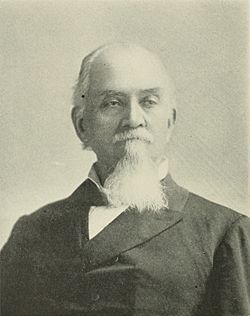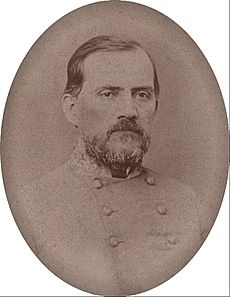Edmund Pettus facts for kids
Quick facts for kids
Edmund Pettus
|
|
|---|---|

Pettus in 1899
|
|
| United States Senator from Alabama |
|
| In office March 4, 1897 – July 27, 1907 |
|
| Preceded by | James L. Pugh |
| Succeeded by | Joseph F. Johnston |
| Personal details | |
| Born |
Edmund Winston Pettus
July 6, 1821 Limestone County, Alabama, U.S. |
| Died | July 27, 1907 (aged 86) Hot Springs, North Carolina, U.S. |
| Political party | Democratic |
| Relations |
|
| Alma mater | Clinton College |
| Military service | |
| Allegiance | |
| Branch/service | |
| Years of service | |
| Rank |
|
| Battles/wars | Mexican–American War American Civil War |
Edmund Winston Pettus (born July 6, 1821 – died July 27, 1907) was a lawyer and politician from Alabama. He served as a United States Senator from 1897 to 1907. Before becoming a senator, he was an officer in the Confederate States Army during the American Civil War. After the war, he was involved with the Ku Klux Klan, a group that worked against the rights of African Americans.
The Edmund Pettus Bridge in Selma, Alabama, built in 1940, was named after him. This bridge became a very important place in 1965 during the Civil Rights Movement.
Contents
Early Life and Career
Edmund Pettus was born in 1821 in Limestone County, Alabama. He was the youngest of nine children. His brother, John J. Pettus, later became the governor of Mississippi. Edmund went to local public schools and then graduated from Clinton College in Tennessee.
After college, Pettus studied law and became a lawyer in 1842. He started his law practice in Gainesville, Alabama. In 1844, he married Mary L. Chapman and they had three sons and two daughters. That same year, he was elected as a solicitor, which is a type of lawyer who represents the state in court.
During the Mexican–American War (1846–1848), Pettus served as a lieutenant with the Alabama Volunteers. After the war, he moved to California for a short time. By 1853, he returned to Alabama and continued his work as a solicitor. He was also a judge from 1855 to 1858. Later, he moved to Cahaba, Alabama, and worked as a lawyer again.
His Role in the Civil War
In 1861, when the American Civil War began, Edmund Pettus strongly supported the Southern states and their decision to leave the United States. He also supported keeping slavery. He helped create the 20th Alabama Infantry regiment and became one of its first officers. He was promoted to major in September 1861 and then to lieutenant colonel in October.
Pettus fought in the western part of the Civil War. He was captured by Union soldiers twice. The first time was in December 1862 during the Stones River Campaign, but he was soon exchanged. He was captured again in May 1863 while defending Port Gibson in Mississippi. However, he managed to escape and return to his own side.
In May 1863, Pettus was promoted to colonel and took command of the 20th Alabama. During the Vicksburg campaign, he and his regiment defended the Mississippi River for the Confederacy. When the Confederate forces surrendered in Vicksburg in July 1863, Pettus became a prisoner again. He was exchanged in September. Six days later, he was promoted to brigadier general.
Pettus and his brigade fought in several major battles. These included the Chattanooga campaign in November 1863, the Atlanta campaign in 1864 (including battles at Kennesaw Mountain and Atlanta), and the Campaign of the Carolinas in 1865. During the Battle of Bentonville in March 1865, Pettus was wounded in his right leg. He was released from military service in May 1865. A few months later, in October, he received a pardon from U.S. President Andrew Johnson.
After the War: Politics and the Klan
After the Civil War, Edmund Pettus went back to Selma, Alabama, and continued his law practice. For more than 20 years, he led the Alabama group at the Democratic National Convention. In 1877, Pettus was named the Grand Dragon of the Alabama Ku Klux Klan. This was a high-ranking position in the Klan, a secret group that used violence and threats to oppose equal rights for African Americans after the Civil War.
In 1896, when he was 75 years old, Pettus ran for the U.S. Senate as a Democrat. He won the election, beating the person who was already in office. At that time, state lawmakers, not the public, chose U.S. senators. His campaign highlighted his role in the Alabama Klan and his strong opposition to the new laws after the Civil War that gave former slaves the rights of free citizens.
Pettus began serving in the U.S. Senate on March 4, 1897. He was re-elected in 1903 and again in 1907. He died in July 1907 in Hot Springs, North Carolina, at the age of 86. He was still a senator when he passed away. He is buried in Live Oak Cemetery in Selma.
The Edmund Pettus Bridge and His Legacy
Edmund Pettus was known as a brave and determined fighter during the Civil War. He was the last Confederate general to serve in the U.S. Senate.
In 1940, a bridge over the Alabama River in Selma, Alabama was named the Edmund Pettus Bridge. In 1965, this bridge became a very important place for the Civil Rights Movement. On March 7, 1965, a group of civil rights marchers tried to cross the bridge on their way from Selma to Montgomery. However, they were stopped and attacked by Alabama state troopers and members of the Ku Klux Klan. This event became known as Bloody Sunday.
In 2020, Caroline Randall Williams, a writer and a great-great-granddaughter of Edmund Pettus, suggested renaming the bridge after John Lewis, a civil rights leader. She argued that the bridge should not be named after someone who fought against the United States and supported systems that treated people unfairly.
Williams wrote in the New York Times:
I don’t just come from the South. I come from Confederates. I’ve got rebel-gray blue blood coursing my veins. My great-grandfather Will was raised with the knowledge that Edmund Pettus was his father. Pettus, the storied Confederate general, the grand dragon of the Ku Klux Klan, the man for whom Selma’s Bloody Sunday Bridge is named. So I am not an outsider who makes these demands. I am a great-great-granddaughter…But here’s the thing: Our ancestors don’t deserve your unconditional pride. Yes, I am proud of every one of my black ancestors who survived slavery. They earned that pride, by any decent person’s reckoning. But I am not proud of the white ancestors whom I know, by virtue of my very existence, to be bad actors.
Another descendant of Pettus, Dave Pettus, also supports renaming the bridge to Bloody Sunday Bridge.
See also
 In Spanish: Edmund Pettus para niños
In Spanish: Edmund Pettus para niños
- List of Confederate States Army generals
- List of United States Congress members who died in office (1900–1949)


